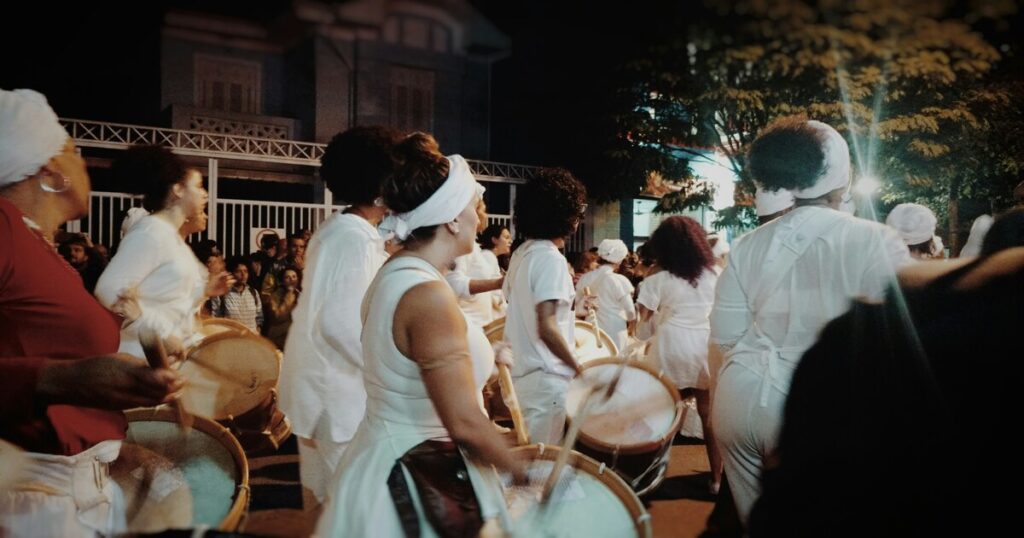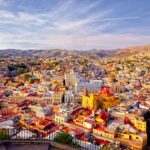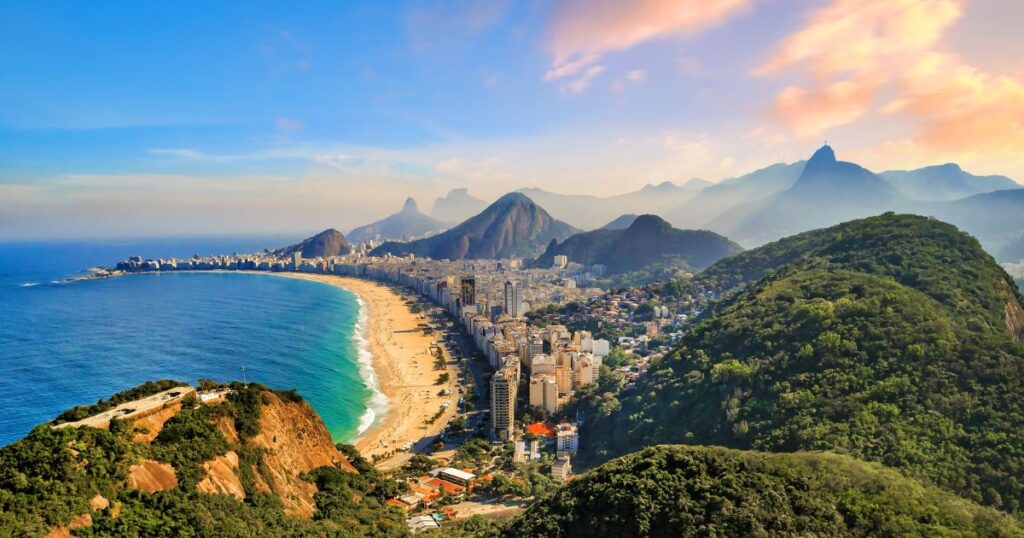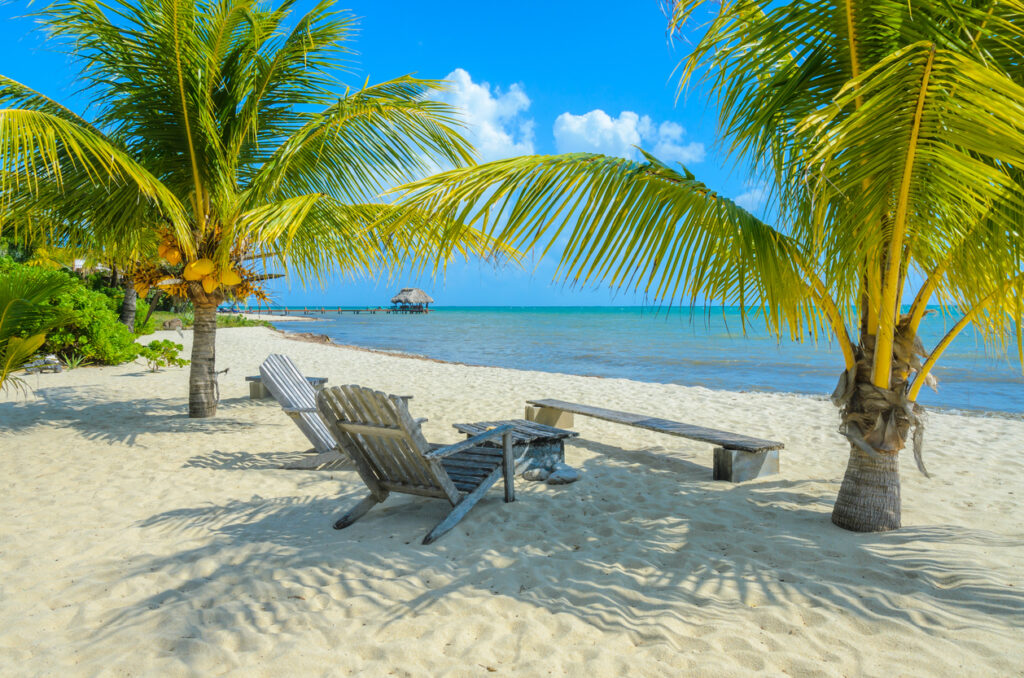If you’re looking for an adventurous retirement destination, you might want to retire in Brazil. Beyond its beautiful beaches, warm weather, and affordability, however, Brazil also offers incredible cuisine, lively celebrations, and gorgeous natural vistas. And with over 85,000 Americans already living in Brazil, you’ll be in good company.
But what exactly does retiring in Brazil look like, and how can you do it? Below, we’ll walk through the need-to-know details.
Key Updates for 2025
- As of 2025, the minimum monthly wage in Brazil is R$1,800 (~$370 USD), affecting cost-of-living calculations for expats.
- Retirement visa applications now take an average of six to eight weeks due to increased demand and processing adjustments.
- US Social Security payments remain taxable in Brazil, but new guidelines clarify deductions and exemptions for foreign retirees.
Pros & cons of retiring in Brazil
As with any place, living in Brazil comes with benefits and potential challenges.
Benefits of retiring in Brazil
Some of the pros of retiring in Brazil include the following:
Climate
Brazil has equatorial and tropical climates generally characterized by hot summers and mild winters — perfect for those who want to avoid the cold.
Natural beauty
Brazil’s beaches are the stuff of legends, with sites like Ipanema, Copacabana, and Baia do Sancho regularly named among the world’s best. The country also boasts lush rainforests, stunning waterfalls, awe-inspiring mountains, enchanting caves, and white-sand dunes.
Cost of living
By some estimates, the cost of living in Brazil is about 70% less expensive than that of the United States, with significantly lower prices for groceries, restaurants, real estate, healthcare costs, and more.
Culture
Any way you slice it, Brazil has a rich and diverse culture. Dishes like feijoada (black bean stew), pão de queijo (cheesy bread made with tapioca starch), and Brazilian barbecue have become popular the world over, as have musical genres like bossa nova and dance styles like samba. Other points of national pride in the country include their indigenous crafts, carnival celebrations, and futebol games.
Potential challenges of retiring in Brazil
Of course, living in Brazil is not without its challenges. Some potential drawbacks may include:
Learning Portuguese
English is not widely spoken in Brazil, with just 1% of the population fluent in it, and another 5% proficient. While those numbers are undoubtedly higher in areas popular among tourists and expats, many foreigners find that learning Portuguese makes their day-to-day lives a lot easier.
Safety in Brazil
Brazil does have a higher level of crime than the US, although violent crime tends to be concentrated in certain areas. The favelas — low-income, underserved settlements common in urban areas — of São Paulo and Rio de Janeiro are particularly well-known for high rates of violent crime like armed robbery. In areas frequented by expats and tourists, however, crime tends to be petty (e.g., pickpocketing) rather than violent. And some parts of Brazil are, in fact, quite safe.
That being said, it’s always worth exercising an extra degree of caution in Brazil: Keep valuables at home, dress humbly, don’t walk alone at night, etc.
Infrastructure
A history of economic instability and political corruption has resulted in relatively poor infrastructure in Brazil — the country was ranked 123rd out of 144 countries in a World Economic Forum report on the quality and level of infrastructure development. This is one of the major challenges President Lula aims to combat with his $200 billion USD infrastructure plan.
Weather
Those who are sensitive to heat and humidity may struggle with hot, muggy Brazilian summers. Most places in Brazil also have a months-long rainy season, although rainfall tends to be short and sporadic.

Healthcare in Brazil for US Expats
Brazil offers both public and private healthcare systems. The universal healthcare system covers all Brazilians and generally offers high-quality care, although the system sometimes struggles with overcrowding, long wait times, and lower quality care/accessibility in rural or less developed areas.
Nearly 25% of Brazilians opt for private health insurance, which typically allows them to access nicer, more advanced facilities and receive care more quickly. When it comes to private healthcare plans in Brazil, expats can choose between international plans, local Brazilian plans, or travel insurance plans. Costs vary widely depending on the company, level of coverage, your age, and your health, but plans are still more affordable than US health insurance.
Best places to retire in Brazil
Brazil is the fifth-largest country in the world. It gives expats a wide variety of geographies, regions, and climates to choose from. A few of the top destinations for retirees in particular include:
Retiring in Florianópolis
Florianópolis — or Floripa, as locals affectionately call it — is a unique city, divided between the mainland on Brazil’s southern coast and the western part of Santa Catarina Island. This charming beach town offers plenty of adventure, like surfing and hiking, but also secluded natural areas great for relaxing. It also has both a bustling, modern downtown and quaint, historical nearby villages. But one of its biggest draws is its food, characterized by delicious seafood dishes like fresh oysters, moqueca (coconut milk fish stew), and all kinds of shrimp.
Retiring in Curitiba
Curitiba, a city in the southern state of Paraná, is sometimes referred to as the most European city in Brazil due to its modern urban planning, sprawling green parks, and excellent public transportation system. Besides its safety and walkability, Curitiba is also lauded for its arts and cultural scene, with scores of art galleries, museums, and theaters to choose from. Make sure to go for a stroll in the Botanical Garden, catch a play in the Wire Opera House, and visit the avant-garde Oscar Niemeyer Museum.
Retiring in Fortaleza
Fortaleza, a coastal city in the northeast of Brazil, boasts white-sand beaches, crystal-clear waters, and warm, sunny weather year-round. History buffs will appreciate the city’s colonial architecture and museums, while shoppers will enjoy the many high-end malls and vibrant street markets. A blend of indigenous, African, and Portuguese influences, Fortaleza’s diverse culture is known for its unique cuisine, forró music, and native crafts.
How to retire in Brazil
Brazilian immigration law only allows Americans to stay in the country without a visa for up to 90 days per stay, or up to 180 days per migratory year, so retirees looking to live in Brazil full-time will need to secure a visa before their move. Fortunately, the country offers a dedicated retirement visa.
Brazil retirement visa
Brazil’s retirement visa allows holders to stay in the country for up to one year and can be renewed for one additional year, after which point holders can apply for permanent residency in Brazil. After four years of permanent residency, you can apply for citizenship.
To apply for this visa, you need a:
- Monthly transfer of at least $2,000 USD to a Brazilian bank account
- Clean criminal background check
- Private health insurance
Pro tip:
To bring dependents with you, you’ll need additional income — unfortunately, Brazil’s government has not specified the exact requirements, so you’ll need to contact the nearest Brazilian embassy or consulate to learn more.
How long does it take to get a visa to live in Brazil?
Once you have submitted your application for the Brazilian retirement visa, you should hear back in about two to four weeks. Keep in mind, though, that it can take several weeks or more to gather all of the required documents for the application:
- Valid passport
- Proof of residence
- Completed application form
- Passport photo
- Visa fee of $290 USD
- Birth certificate (original and copy)
- FBI background check
- Private health insurance
- Flight itinerary
- Proof of retirement and ability to transfer funds
- Proof of monthly income
How much does it cost to retire in Brazil?
Given that the average monthly income in Brazil is R$1,625 (~$331 USD), it stands to reason that the cost of living would be lower than it is in the US. While your budget will, of course, depend on your specific location and lifestyle, expats report their cost of living to be between $800 and $1,900 USD per month.
To qualify for the retirement visa, it’s worth noting, though…
- These figures will fluctuate based on the strength of the US dollar to the Brazilian real.
- You’ll need to be able to transfer at least $2,000 per month to a Brazilian bank account.
Pro tip:
Traditional wire transfer services can be slow and expensive, so most expats opt for an online transfer service like Wise.
Retiring in Brazil on Social Security: Considerations
The average US social security check is $1,907 USD per month. For comparison, pensions in Brazil range from a minimum of R$1,320 (~$270 USD) per month to a maximum of R$ 7,507.49 (~$1,527 USD).
While it is possible to live on less than the average social security check in many places in Brazil, it’s safer to have income from additional sources (e.g. 401ks, IRAs, rental income, etc.). Keep in mind, too, that US social security distributions are subject to taxation in Brazil.
Do Americans pay tax in Brazil?
Many Americans living in Brazil as retirees are subject to taxes by both the Brazilian and US governments. But don’t worry — that doesn’t necessarily mean you’ll be taxed on the same income twice. Here’s how it works:
Brazil taxes
Americans on non-employment-related visas who spend at least 183 days in Brazil in a given year meet the definition of tax residency. They are taxed on their global income at rates of 0% to 27.5%, depending on their income. Americans who don’t meet the definition of tax residency, on the other hand, are taxed only on Brazilian-sourced income.
Unfortunately, there is no Brazil/US tax treaty. But there are still ways to avoid double taxation that we’ll go into below. What’s more, there is a Brazil/US totalization agreement in place, which prevents Americans living in Brazil from having to pay social security taxes in both countries.
US Taxes
Due to the US’s unique citizenship-based tax system, all US citizens and permanent residents — even those living abroad — are subject to taxation on their worldwide income as long as they meet the minimum income thresholds.
There are tax breaks that can offer relief for expat retirees, however, such as:
- The Foreign Tax Credit (FTC): The FTC allows US expats to essentially subtract what they have paid in income taxes to a foreign government from their US tax bill (though, as with all things US-tax related, it’s not quite that simple)
- The Foreign Housing Exclusion (FHE): Expats who meet either the Physical Presence Test or the Bona Fide Residence Test can use the FHE to write off qualifying housing expenses like rent, utilities, property insurance, and more
And don’t forget that:
- Withdrawals from post-tax retirement accounts, like Roth IRAs and Roth 401(k)s, are tax-free.
- Only up to 85% of your social security payments are subject to taxation.
Retirees should be aware, however, that living abroad may trigger additional reporting requirements. As a quick example, consider the Foreign Bank Account Report (FBAR) and Form 8938.
References:
- Observatório das Migrações em São Paulo
- Brazil vs United States – Cost of Living Comparison
- In Brazil, only 1% of the population speaks English fluently
- The Global Competitiveness Report, 2015–2016
- BRAZIL | Summary | Columbia University Mailman School of Public Health
- VITEM XIV – Retirement
- Brazil Visa Application Online
- Nominal monthly per capita household income of residents in Brazil in 2022, by state
- Cost of Living in Brazil – Moving To Brazil in 2023
- How much Social Security will I get?
- Congress Approves Minimum Wage and Tax Threshold Hike
- Social Security Law
- Brazil – Individual – Residence
- Jaú, a cidade mais segura de um Brasil cada vez mais violento
- Which Languages Are Spoken in Brazil?
Disclosure: Some of the links on this website may be affiliate links. This means that we may earn a small commission at no additional cost to you if you take any action through those links. We only recommend products and services that we have personally used or thoroughly researched. Your support through these affiliate links helps us continue to provide valuable expat tax services. Thank you for your support!
FAQ: Retiring in Brazil
-
Can US retirees collect Social Security while living in Brazil?
Yes, Americans can collect Social Security payments while living in Brazil. However, they may be subject to Brazilian taxes if they qualify as tax residents.
-
How long can I stay in Brazil without a visa?
US citizens can stay in Brazil visa-free for up to 90 days per visit and a maximum of 180 days per year. To stay longer, you’ll need a visa.
-
Do I need to pay US taxes if I retire in Brazil?
Yes, the US requires all citizens to file taxes on worldwide income. However, expats can use the Foreign Tax Credit (FTC) and Foreign Housing Exclusion (FHE) to reduce or eliminate double taxation.
-
Is healthcare in Brazil free for expats?
Public healthcare in Brazil is free, but it can be slow and inconsistent. Most expats opt for private health insurance, which costs significantly less than in the US.
-
What are the safest cities for retirees in Brazil?
Some of the safest and most popular cities for retirees include Florianópolis, Curitiba, and Fortaleza, which offer strong infrastructure, lower crime rates, and vibrant expat communities.

 Connect on LinkedIn
Connect on LinkedIn




